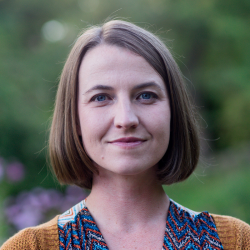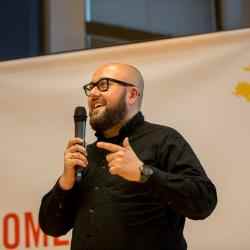Introduction
Irfan is countering the trend toward religious extremism and other forms of intolerance by cultivating faith -based peace movements, preparing a generation to become “Agents of Peace.”
The New Idea
Irfan founded his social movement on the idea that young people can develop and practice their own approaches to peace, tolerance, and nonviolence as a deliberate alternative to the growing influence of religious and political extremism. By working with religious organizations to reach adolescents, Irfan aims his work at schools, extra-curricular clubs, and alumni networks where radicalization often takes place. Irfan describes the Peace Generation as a way to “inoculate” young people from the social ills of hatred, discrimination, and violence.
Irfan’s “Agents of Peace” and other participants in the “Peace Generation” make up a network of young people, activists, some teachers, and alumni willing to lead their own local efforts to instill the values of peace and tolerance into the experience of growing up. As Irfan’s Agents of Peace, they might be involved in any of a number of activities, from leading peace-focused scriptural studies to organizing their school to deal with bullies. Irfan sees any local act of violence or injustice as an opportunity to build a tolerance movement. Once trained, the Agents of Peace remain engaged through a virtual global network and annual Peacetival gathering. Irfan also supported them with tools such as training modules, books, campaign materials, branding, and access to various personal development opportunities.
To replicate this idea, Irfan developed partnership with local and international institutions, including the Ministry of Sport and Youth Empowerment. Since 2007, Peace Generation has built a network of over 3,000 trained Peace Agents throughout Indonesia, also in neighboring countries like Singapore, Malaysia, Australia, Thailand, and The Philippines. Peace Generation and several NGOs also initiated Civil Society Against Violent Extremism (CSAVE), a consortium focusing in combating radicalism in Indonesia.
The Problem
Indonesia is seeing a rise in extremist groups that sharp religious and ethnic distinctions with mainstream society. One result is prejudice, which can lead to communal violence, a threat to Indonesia’s diverse society. Extremist groups appeal to a segment of young people, in their early teens or pre-teens. Thus, schools become an entry point to instill ideas of intolerance and radicalize students. Yet even in conservative schools, radicalization does not happen in the classroom itself, but in the clubs and activities surrounding the students. According to a survey conducted by LAKIP (Institution for Islam and Peace Studies) in 2011, near half of students felt that violence could be justified in the name of religion. A more recent survey about perception on tolerance among high school students, conducted by SETARA Institute in 2015 reported that 36 percent of students were passive intolerants, 32 percent active intolerants, and .3 percent admitted to agreeing with terrorism. As religious related activities are generally considered good, most schools and teachers are not aware how radicalisation was infiltrating into student religious groups, extracurricular activities, and even indirectly into the curriculum.
Radicalism leading to violent extremism is not the only threat. Other forms of intolerance are on the rise. Outbreaks of bullying and gang fights were reflected in the number of one million cases of violence in schools, as reported by Indonesia Child Protection Commission in 2014. Most schools and teachers are either unaware or unequipped to counter a culture of intolerance and violence. Apart from disciplinary measures to perpetrators, there’s no systemic prevention effort to tackle this issue. Workshops on conflict resolution exist, for example, but only as individual projects in specific conflict-ridden areas. Other peace-building models were also available, but failing to spread to schools and communities because they were too conceptual and complex, rather than applicable and engaging. Others had been so secularized that they found no common language with local religions.
The Strategy
At the core of Irfan’s work is the interest and commitment of his Agents of Peace. Irfan aims to build them into a network influential enough to tip peace values into the mainstream of Indonesian culture.
The Agents of Peace include teachers, volunteers, activists, as well as students, some of whom know intolerance firsthand. These are citizens, often related to schools, who have heard about Irfan’s Peace Generation Upon completion of the modules, they make declarations of “The Peace Promise,” and receive a symbolic badge validating their identity as Agents of Peace. To celebrate their efforts, Peace Generation offers The Young Peacemaker Award. Among the exemplary awardees is Ishaq Sawawa, an undergraduate student of Muhammadiyah University in Gorontalo, a part-time English teacher who independently incorporates the modules into several forums: his English class; a public interfaith dialogue in his university; and the pesantren (Islamic boarding school) curriculum in Surabaya.
However, Irfan understands that tolerance must be taught through experience. Peace Generation organizes events based on “programmed confrontation of different stereotypes.” For example, in “Breaking Down the Walls,” students from one international school might visit a pesantren, thus offering the opportunity to break down their personal stereotypes and prejudices. Another example is “Rock the Peace,” which invites two bands from different cultural backgrounds to perform on one stage. In “Kick for Peace,” local youth from various regions in Indonesia have come together to form a football club, which is known for its camaraderie and fair play.
Irfan now plans to expand his network across borders and faiths. His partnerships with Christian churches follows the same pattern as his innovations within Islam. By customizing the basic values of peace into religious specific context, Irfan proved how tolerance is not a foreign secular idea. This has increased acceptability of the idea among religious communities, such as pesantren as well as Christian schools.
Irfan religious narratives on war and conquest. They relate heroism, comradery, risk and reward, purpose and belonging-- messages that appeal to vulnerable youth, psychologically insecure, or seeking to escape some dysfunction at home or other cause. To build the counter narrative, Irfan first distilled universal 12 values of peace, which explore themes of self-acceptance, prejudice, racism, religious intolerance, sexism, socio-economic class, gangs and cliques, embracing diversity, understanding conflict, denouncing violence, admitting mistake, and forgiveness. The values aim to change the mindset on proper view of self and of others, as well as skillset on relationship and conflict management. The values are linked to scriptural verses, highlighting how every religion can choose to emphasize peace and tolerance over war and conquest.
Irfan’s method includes bringing former extremists and victims of violence to discuss reconciliation. He wants young people to see the entire cycle of radicalism, who it affects, and how it has shaped their lives. Irfan sees that such presentations make a deep impression on young people, which they translate into action by looking into local issues, in particular bullying or social exclusion.
These simple processes reveal a wealth of experience and ongoing action. Irfan documents this and publishes it as educational material. Most of their work has been in Islamic materials, and now Irfan is developing their Christian peace curriculum, with Buddhist and Hindu versions to follow. Partner groups across Asia are working with Irfan on translations into Philippines Moro, Thai, and Urdu. All of the publishing and distribution is undertaken by a foundation Irfan started to support the network.
To measure impact, Peace Generation collaborates with psychology department of UIN Bandung in a join research on students knowledge, attitude, and perception on violence and intolerance. Among the results, is 31.6% decrease of aggressiveness level among students in Cirebon, an area infamous as target of radicalization. Irfan is also developing measurement tools to keep track of the growing network of Agents of Peace and its impact. In 2016, Irfan launched an online platform where Agents of Peace can login and post progress to show the result of their work in their community and highlight success stories.
The Person
Irfan was born in a strict and conservative Islamic family and grew up in a high-density area in Cibeureum, Bandung, West Java. He spent his childhood making friends with children who shared the alleys, who happened to come from different cultures and faiths, and recalled clearly feeling perplexed at how the adults around him had prejudice against people of different background. However, his father later sent him to an Islamic boarding school in Garut, expecting him to become a cleric. Six years living in a closed community of Pesantren made him almost radicalized, as he was taught doctrines that stereotyped other faiths and peoples.
Irfan credits his ability to resist narrow ideology to his own childhood friendships with Chinese or Christian friends. Experience, he concluded, not just lessons in a book, is what protects us from hateful rhetoric. During his university days in Islamic State University Sunan Gunung Djati, Bandung, he joined Muhammadiyah Youth Association, in which he explored his interest in using religion to promote peace. With friends, Irfan initiated a peace study group that would gscreen movies about human rights icons such as Chico Mendez and Mahatma Gandhi, to raise awareness of non-violence principles. He joined the Indonesian delegation in a number of regional and international forums about peace and tolerance.
Irfan is also an active writer, editor, and filmmaker. He initiated with his colleagues “Pesan-trend” magazine, which was well accepted and distributed in Garut District, and later Retas (Resistensi Tanpa Kekerasan – Resistance without Violence), which then became supplement for national prominent teen magazine. After getting married, Irfan worked at Mizan Publishing company, a renowned Islamic book publisher, where he learned about making media for children and youth and later served as CEO of Mizan Pelangi, a direct selling subsidiary. Familiar with modern marketing theory, Irfan match the concept in his business and social activism, for example by empowering housewives to become book reviewer and sales agent, thus increasing literacy culture.
The idea to establish Peace Generation followed his encounter with a Christian-American English tutor. Both instantly disliked the other, but in time realized that they had simply been conditioned to oppose one another. Recognizing and then unlearning this behavior became the driving purpose behind Peace Generation.
In 2010, Irfan pursued his master degree in co-existence and conflict studies in United States, which helped him understand peace and conflict issues in a more systemic way. During his stay in Boston, he was exposed to work of Ashoka Fellows, such as Eric Dawson of Peace First. This motivated him to also took courses in strategic management, social entrepreneurship, fundraising, and social marketing. Upon returning, Irfan has been using the knowledge to help Peace Generation sustain and scale in South East Asia.
Irfan piloted this module in post-conflict Aceh in 2007, under Unicef peace education program. In their evaluation reports, teachers and headmasters noted a change in students’ behaviour, including improvements in public speaking, teamwork, and respect. Most teachers even reported that their personal problem solving and critical thinking skills had improved as they began using the educational tools. Moreover, many teachers changed the way they behave within their own families, especially regarding child discipline and anger management. The module was recommended to be adopted by Aceh Provincial Education Office.




